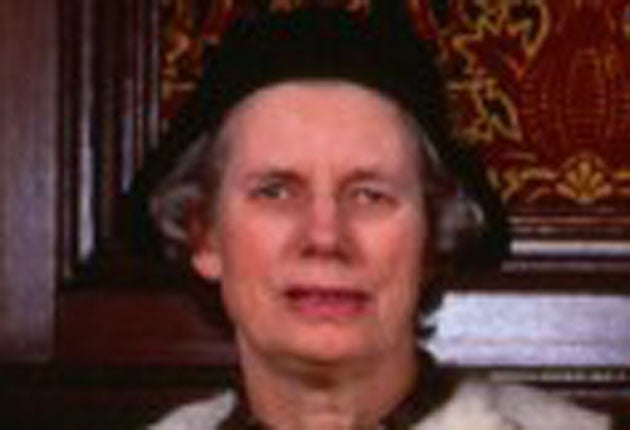Baroness Carnegy of Lour: Farmer who became a life peer respected by allies and rivals alike in the House of Lords

Between 1982 and 2005 when parliament was in session, every Monday at Edinburgh airport and most Thursdays or Fridays at Heathrow, it was possible that I would bump into Elizabeth Carnegy going to and fro to carry out her duties in the House of Lords to which she had been elevated by her admirer, Margaret Thatcher, in 1982. Duty was what she was about: no life peer or baroness took the Lords more seriously. And in consequence, I was told by Labour peers who did not share many of her views, that though she was very much an archetypal Tory lady, they took her seriously and liked her. And they were right to do so. She was utterly sincere, sensible and forthright in her views, and devoid of political malice.
Elizabeth Patricia Carnegy of Lour was the daughter of two remarkable parents. Lieutenant-colonel Ughtred Elliot Carnegy of Lour, DSO, MC and the 12th Laird, served as ADC to the commanding officer of the 3rd Cavalry Division in the First World War; I was told that he was unlucky not to be awarded a Victoria Cross. Her mother Violet was awarded the MBE for her services as Scottish chief commissioner of Girl Guides. My mother was county commissioner of Girl Guides for West Lothian and for that reason invited Violet Carnegy to stay the night after some meeting. She brought with her the14-year-old Patricia. As a seven-year-old indelibly marked on my memory was the girl who was very bossy. Years later, when I told Baroness Carnegy what I thought of her as a teenager, she replied in her usual feisty fashion 'you were a pretty insufferable brat yourself, I remember'."
I repeated the substance of this story to the Secretary of State for Scotland, George Younger, and commented on how bossy she had seemed. Younger simply smiled and said, "Par for the course. Character doesn't change. But she's an extremely good woman who really rendered huge service to youth in Scotland". She certainly had.
Leaving Downham School in Essex at 18, she worked in a menial capacity as an assistant in the Cavendish Laboratory in Cambridge. She was brought into contact with radiation physics, working in the orbit of the great men of the day. This rubbed off on her and she had a good understanding of the issues of science and technology.
Inheriting her parents' farm, she operated it as a potato farm with breezy efficiency and found time from 1947 onwards until she retired in 1989 to serve the Girl Guides Association. She was county commissioner for Angus from 1956-63, training advisor to the Guides in Scotland from 1958-62 and training advisor at the Commonwealth headquarters of the Guides from 1963-65. She wrote a number of practical and useful booklets which were used by the girl guides throughout the United Kingdom for a number of years.
Elected to the Tayside regional council (1974-1982), she was chosen as convenor of the recreation and tourism committee, while giving valuable input to the education committee. That was why she was chosen by a Labour government as chairman of the working party on professional training for community education for Scotland. This was a slightly controversial choice at the time because understandably there were a number of possible Labour chairmen who thought they ought to have been preferred. But the results were such that the consensus was that she had done a good job. She was one of the most active members of the Council for Tertiary Education for Scotland (1979-84) and of the Scottish Economic Council (1981-93).
From 1984-1996 she was on the Council of the Open University and used her position in the House of Lords to further their cause. She liked to remind me that it was Margaret Thatcher who saved the Open University from extinction and argued its case even when Iain Macleod, in his brief time as Chancellor of the Exchequer, wanted to kill it off "as one of Harold Wilson's gimmicks". She was an assiduous attendee at a number of the unsung Lords select committees, such as the Scrutiny Committee on the European Community and the Select Committee on Delegated Powers and Regulatory Reform. She was also a valuable trustee of the National Museum of Scotland.
Elizabeth Patricia Carnegy, farmer and politician: born London 28 April 1925; cr. life peer, Baroness Carnegy of Lour in the District of Angus 1982; died Lour 9 November 2010.
Subscribe to Independent Premium to bookmark this article
Want to bookmark your favourite articles and stories to read or reference later? Start your Independent Premium subscription today.

Join our commenting forum
Join thought-provoking conversations, follow other Independent readers and see their replies